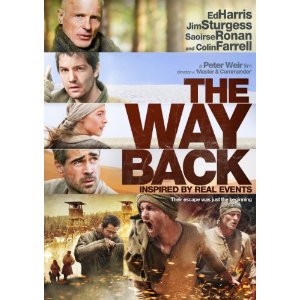The Way Back is a surprisingly good film. It debuted back in 2010, it stars relatively unknown performers (other than Colin Farrell) along with relatively unknown crew, though some might know director Peter Weir’s most famous works, Dead Poet Society and The Truman Show, among others.
Anyway, The Way Back tells the story of six men who escape not only a Soviet Gulag in Siberia but the entire Soviet Union and Communist-Mao China by walking more than 4,000 miles to British-occupied 1930s India. While the feat may seem like Hollywood exaggeration, surprisingly enough the film was based on a true story, first written by Sławomir Rawicz and call ‘The Long Walk’ back in 1955. While some accounts suggest that Rawicz fabricated if not the entire story then at least part of it, as James Frey’s semi-factual ‘A Million Little Pieces’ teaches us, people don’t really care if the story is true or not, just so long as it entertains.
And The Way Back certainly achieves this goal. The most promising features are the fact that, unlike other WWII and Soviet-Union pieces, The Way Back isn’t overtly political. In fact, it’s a nice break away from the overplayed idioms of how Communism is bad and Capitalism is good, but rather captures these very desperate men, and one woman, running for their lives from an oppressive, totalitarian state bent on destroying them.
Sure, there are political subtleties and undertones, but for the most part, Peter Weir does a good job not making it dogmatic. It’s more like a film about these individuals in this vast land, paradoxically trapped. And so in some ways it’s a depiction of a spiritual journey. If not spiritual, then at least mental, because there is a level of mental wear-and-tear that each character experiences along with the physical exhaustion it takes to travel that far on foot since the terrain was volatile and they needed to avoid towns and villages because of the bounty on their head.
The Way Back is that rare combination of historical piece mixed with a long journey along with intense character development that makes it such a great film. While the length, a little over two hours, may seem like too much for some since the film is almost entire a depiction of these people walking really far, it is certainly worth watching as an inspirational film about the lengths man can and will go, both physical and mental, to survive.





